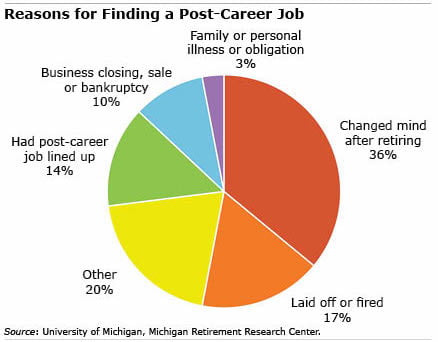
Boomers Move into Post-Career Jobs
 Many baby boomers retire the conventional way – by leaving their career jobs. For the others, the first step in retiring involves stopping over in a different job than they’ve held for years.
Many baby boomers retire the conventional way – by leaving their career jobs. For the others, the first step in retiring involves stopping over in a different job than they’ve held for years.
A sketch of the older workers who transition to post-career jobs – and their reasons for doing so – emerges from a survey of a fairly elite group of mostly college-educated professionals: clients of the Vanguard investment company.
They made the job transitions for a variety of reasons. More than half of them either had initially retired but decided to go back to work or were forced out of a long-term job by a layoff, firing, or business closure. However, Vanguard’s clients are apparently in good health, because they rarely made changes due to a medical condition.
The boomers usually changed jobs during their 50s. The post-career jobs were often in entirely different occupations or industries, which required the workers to make big trade-offs, according to the 2015 survey, which was designed by Vanguard and several academic researchers.
The old positions were usually full-time, and, as a result, had rigid schedules. Half of the people who found a new job said they now have flexible schedules. But everyone who moved into a post-career job took a 20 percent pay cut, on average, either because they’re working fewer hours or are in a different industry or occupation where the skills honed over the years are not as valued.
There’s also telling evidence that many of the boomers in post-career employment were eager to make this tradeoff. They typically moved from the career job to the new one in about a month, an indication that many had landed the new job prior to leaving the old one.
Such a rapid transition, the researchers said, “hints that what is desired in late life is less burden of work rather than more pecuniary compensation.”
This pattern, however, may be a luxury that only higher-paid workers can enjoy.
To read this study, authored by John Ameriks, Joseph Briggs, Andrew Caplin, Minjoon Lee, Matthew Shapiro and Christopher Tonetti, see “Shocks and Transitions from Career Jobs to Bridge Jobs and Retirement: A New Approach.”
The research reported herein was derived in whole or in part from research activities performed pursuant to a grant from the U.S. Social Security Administration (SSA) funded as part of the Retirement and Disability Research Consortium. The opinions and conclusions expressed are solely those of the authors and do not represent the opinions or policy of SSA, any agency of the federal government, or Boston College. Neither the United States Government nor any agency thereof, nor any of their employees, make any warranty, express or implied, or assumes any legal liability or responsibility for the accuracy, completeness, or usefulness of the contents of this report. Reference herein to any specific commercial product, process or service by trade name, trademark, manufacturer, or otherwise does not necessarily constitute or imply endorsement, recommendation or favoring by the United States Government or any agency thereof.






